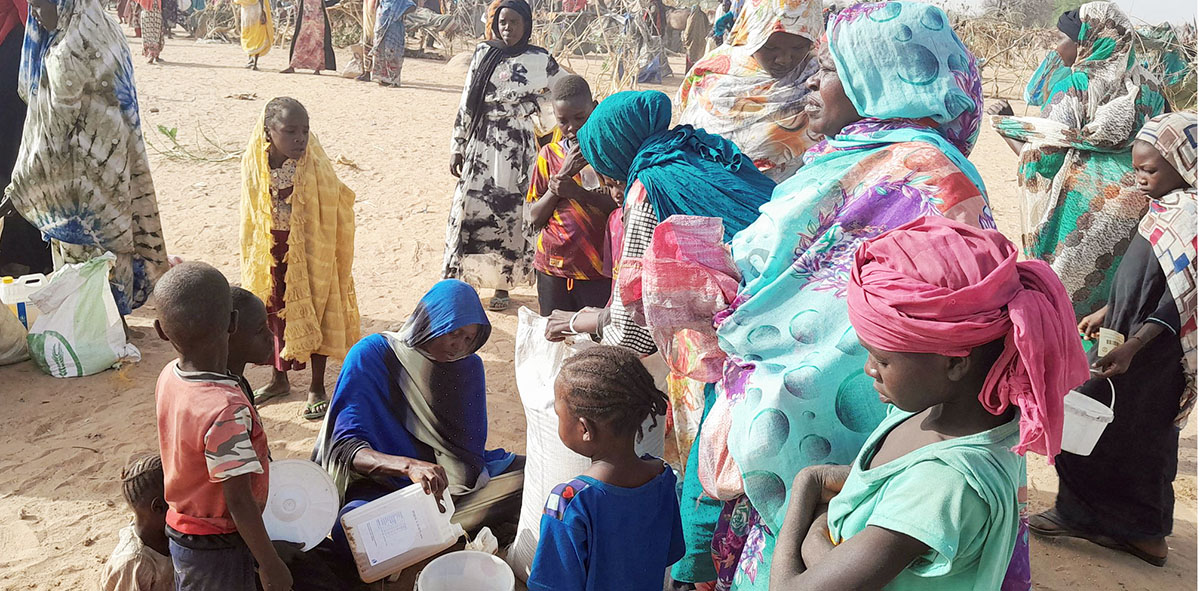
Moatinoon monitor displacement suffering and winter fears
White Nile - Moatinoon
As the ongoing clashes expanded south of Khartoum, the citizens of Jabal Ulia and the Salmaniya region found themselves among the voices of guns and denunciations from every direction. When an ammunition warehouse at Jebel Alia camp last week and the exchange of engagement within the neighbourhood by the parties to the war, Army and Rapid Support, served as the most dangerous whistle for its citizens, having to leave their homes after a day of terror and panic in search of safety, they found another suffering ahead.
White Nile State was the closest destination to displaced persons from southern Khartoum. According to officials and press reports from August to September, White Nile State has 252 shelters and 11 refugee camps, hosting more than 7 thousands of families.
When one of the shells fell in the ammunition warehouse of Jebel Olya camp, located west of the hospital last week, we experienced a day of terror and panic. We watched the fire and we heard the sounds of shells and guns and bullets and our sleep was disturbed and our fears were raised so that we turned to the catacomb as the nearest city and we knew nothing about it.
In her account of moatinoon, she adds: We came and rented a house containing a room and lounge and we are more than 20 people for 300 thousand pounds, yet some of us rape the land. She wonders: We dont know what happens if the winter comes and we are in this situation, let alone the poor economic and living conditions. All the news to us is that the security situation is precarious. I never imagined that we would suffer to be safe.
Amira, coming from Rashid Khartoum, adds to moatinoon: Since the war began, we have not had a quiet day. On the day she and her sons decided to leave her home, clashes between the parties to the conflict in Camp Taiba, while her husband continued to live in harsh conditions under war with a total lack of services in the region.
The four-decade, Amira, who harboured her family in one of the base schools of El Qutena, tells: Its safe here, even though my sons sleep on wood boards. My eldest and I are searching the Earth. But that is better than we experienced than the dismay of the past days.
We asked her about the living situation, and she said, Its so bad, especially because her husband, who works as a driver, didnt come with her. He hasnt worked for a while, she adds. Here are some neighbours helping us, and local officials come one of them every day and record our name on a paper, but they havent come up with anything to this point.
Umnaiat, ten years old, told citizens: As soon as we heard the sound of the shells, my father decided to take us anywhere out of fear that my brothers and I would get hurt, and we settled with our relatives. Umnaiat says she fears for her brother because they leave him behind and that she wont be reassured until she sees him in front of her.
Aisha, who has cursed war a thousand times, spoke with great sadness because she lost her hearing from the sound of missiles. She told ”moatinoon” that she had to be displaced after clashes between the two sides of the war had increased, and after their logic had become almost empty of citizens and their neighbours. Aisha stays with a family she hosted for a few days but is looking for a comfortable place to accommodate her with her family without restrictions.
Despite Aishas insistent question as she talks to us about the existence of a nose, ear and throat specialist and hopes that life will return to her sense of hearing, she has not hid her anxiety and illness on her sick brother with kidney failure. She told moatinoon: When all the health centres were closed there, she meant at Jabal Awlia, I quickly thought about finding a dialysis centre. But unfortunately we found a number of patients ahead of us at the center, and then we traveled to Kosti City in order for my brother to get even one laundry but to no avail. When we arrived, we found the devices broken and had to go back to the catacomb again, and now we have no solution but to wait.
Bohitha, who lives in the New Hilah neighbourhood of Mount Parents and works as a university employee, says moatinoon: This is not the first time that my five children and I have been displaced. In the first two months of this war we were displaced to an area near the mountain, and we spent a harsh period in school as the living situation deteriorated. I havent been paid since last March, and my husband is an almost unemployed straw driver, even the food that comes to us was not enough. We tried to find a source of income to run our business, but we didnt get along. We had to return to our home, and as soon as the clash intensified in the past days, we came and stayed with a family of our acquaintances. She adds: The hardest need is to be outside your home.
Kosti, White Nile States largest city, has 80 shelters hosting 13.388 displaced persons and 13 shelters and others with families in the region. In Jebelin, 246 families are in shelters at the Jebelin local level.
The population of Khartoum has been living in its three cities and extremes since 15 April. The war between the Sudanese army and the rapid support militia, in which thousands of innocent civilians were killed and millions displaced from their homes, became displaced persons and refugees inside and outside the country. Sudanese generally live in the worst conditions owing to the consequences of the war and dire economic conditions.

